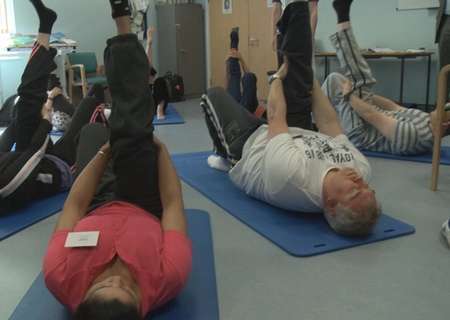Physical work not the main cause of intervertebral disc degeneration

Even if you do not suffer from pain in the intervertebral discs in your lower back, it is a sure bet that you know someone who does. Yet, surprisingly little is known about what causes this disc degeneration. And there is a widespread conception that it results from excessive physical work. Now the EU-funded project, Genodisc, completed in 2013, is helping to put our understanding of this disabling condition onto a more scientific footing. The project looked for correlations between symptoms of back pain and genes that might be associated with it. "That will give us a proper scientific approach, instead of working blindfold, as we do today," says project coordinator Jill Urban, research lecturer in the Department of Physiology, Anatomy and Genetics at the University of Oxford, in the UK.
Before the project began, "we knew that the 'myth' of back pain resulting from excessive physical work is false," Urban tells youris.com. "It is caused by degeneration of the soft intervertebral discs in the spine, but plenty of people with poor disc condition have no pain. In the past, disc degeneration has been used as a surrogate for pain. But now we are exploring it directly," she explains.
The finding that low back pain has a strong genetic component was proved by work with twins in Finland. And it has since been replicated elsewhere. But, it is difficult to study the genes responsible for less intense back pain. "Because 80% of the population have this sort of pain, it is almost impossible to find the genes for it," says Svetlana Solovieva, an epidemiologist at the Finnish Institute of Occupational Health, in Helsinki. "But we can look for the mechanism behind pathological change leading to severely disabling pain. This affects perhaps 5% of the population and can cause the need for surgery. This sort of pain might be 20% to 25% heritable, so there are other factors at work besides genetics," she explains.
We are not even sure that bad lifting technique is responsible for back pain, according to Solovieva. But she adds: "We do know that there is probably some relationship to trauma; perhaps small effects that we term microtraumas. It could be that the genes we are identifying cause slower recovery from trauma."
Therefore, the project firstly examined the symptoms of back pain by looking at disc samples and MRI scans. They then examined blood samples to look for the associated genes. "We now have candidate genes for painful disc degeneration. This is a complex disorder. So the idea is to find the genes that suggest a cellular pathway that leads to painful disc degeneration," Urban explains.
One expert is impressed by scope of the project. Both the scale and ambition of the project are unusual and should lead to new insights, according to Kenneth Cheung, professor in spine surgery and head of the Department of Orthopaedics and Traumatology at the University of Hong Kong, in China. Cheung is the discoverer of mutations in genes that control the production of the collagen which fills the intervertebral discs. And he is carrying out similar research in a very different population, that of southern China.
He agrees that medical practitioners, alongside the general public, are unused to the idea of a genetic link to lower back pain. "The pain was always attributed to wear and tear or to ageing. Until the last few years when genotyping and gene sequencing became available," he says. "Now we are finding the genes that might give you a predisposition to back pain." This could help deal with back pain. "With a better handle on why we get the pain, we can design better interventions. And give better advice. We know that smoking and obesity are both risk factors for back pain," he tells youris.com.
Another expert commends the project's approach. "[The project's] work and thoughts on this are very original," says Shanmugarathan Rajasekaran, chairman of the Department of Orthopaedic and Spine Surgery at Ganga Hospital, in Coimbatore, India. He believes that a mix of mechanical and genetic influences is responsible for low back pain.
But he warns that low back pain is also a developmental matter. "In developing countries, many people still exist under 'no work - no food' conditions. Here, we see many people doing hard work labour. But the incidence of low back pain is still very low. However, in countries where there is social security and leave without loss of pay, low back pain is common," he tells youris.com.



















